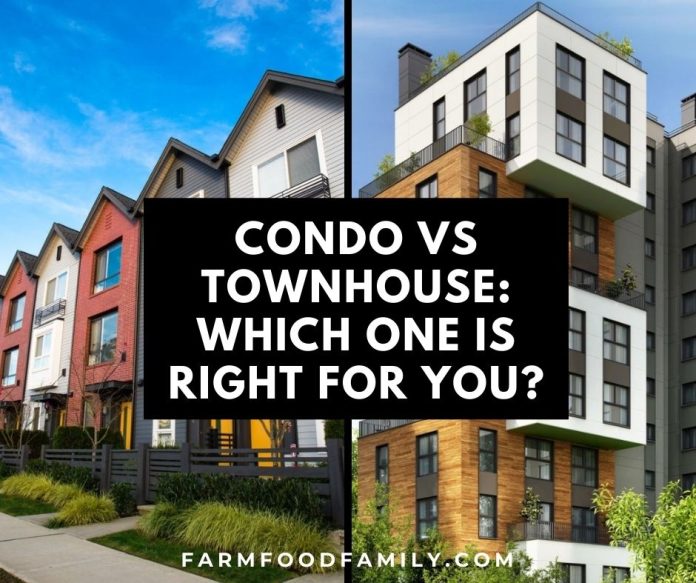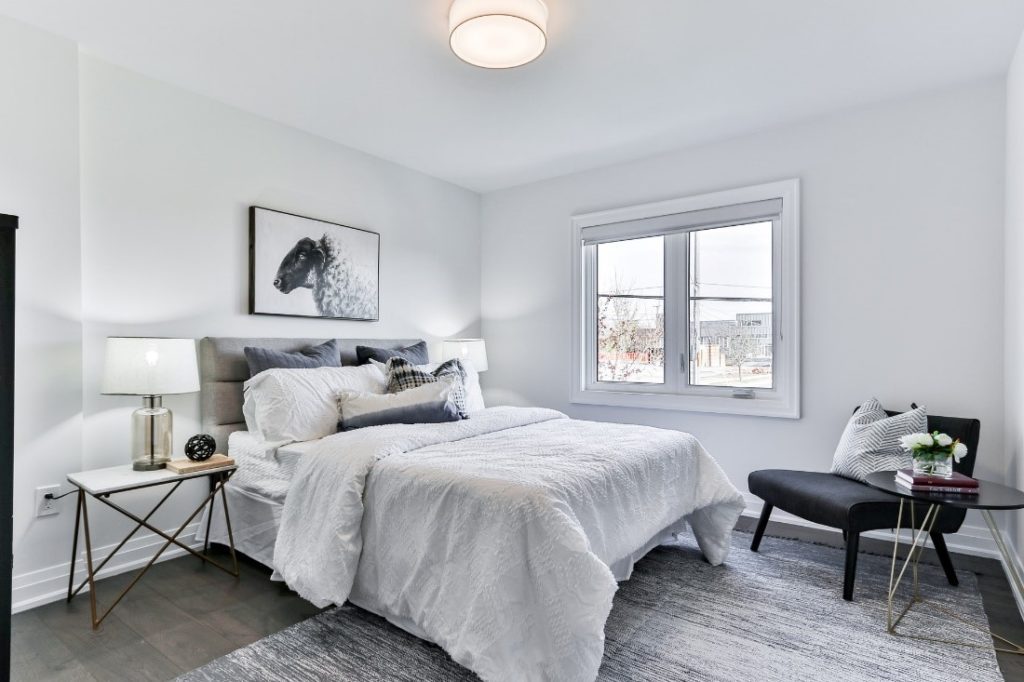
Purchasing and owning a townhouse or a condo can be a rewarding and profitable financial option. Unlike bonds and stocks investors, real estate buyers can leverage their acquisition by paying a portion of the total cost ahead and then repaying the remainder, plus interest, over years.
That being said, buying a house is a major decision that should not be taken lightly. It is a significant milestone in one’s life and signifies a certain level of financial independence. When it comes to purchasing a home, many potential buyers are confused about what type of real estate to choose, whether to live in a townhouse or a condominium.
Here, we will review some pros and cons of townhouses and condos, so that you are better equipped to make a smart decision. Let us begin first with the condos:
Related: 41+ Popular Types Of Houses With Names and Photos
WHAT IS A CONDO?
A condo, short for “condominium”, is a single private structure or a community of buildings where individual occupants (the owners) own independent units). Individual residences to high-rises, condos come in a variety of sizes and styles. As a condo owner you share common areas with other condo owners in the community.
A fitness center, pool, and well-kept grounds come under common areas. Condo owners pay a monthly fee to keep these facilities in good condition. If you want to know more about condos, you can find more info here.

(Image Source: Pixabay)
Condominium Association
The functions of a Condominium Association in condos are the same as the HOA in a townhouse. A condominium association is a group of owners or tenants who live in a building or apartment complex that is separated into different apartments.
PROS OF CONDO
Reasonable Price
In real estate, condos are often priced lower than single-family homes. Depending on the region and the community, in some cases, the asking price for a property is dramatically lower than a single-family home. So, if you want to dive into homeownership when your budget is limited, condos can be a great first step.
Condos have a high value in the market. The capital value of condos increases over time, especially because the areas where they are often located, are highly sought after.
Maintenance
When it comes to condo living, maintenance can be the biggest pro. Everything outside the four confinements of your condo is taken care of by others.
If you are someone who has a busy schedule or someone who likes to travel, a condo is ideal for you since you will be able to enjoy all the amenities provided without actually taking part in maintaining its upkeep.
Amenities
Now, different condos provide different amenities. They are subjective and dictated by clients’ demands and the type of place and climate where your condo is located.
However, some basic fundamental requirements like 24 hours parking space, extra storage space, gym or fitness centre, parks in close proximity, eco-friendly and energy-efficient buildings are indicative of a good condo.

(Image Source: Pixabay)
Rent
Many condos are located ideally in vibrant urban areas where space is limited. This limited space creates demand, as most people are looking for a place to rent, close to their workplace.
Security
When it comes to security, condos have advanced home security. This is crucial because the number of people associated with a condo building is more in comparison to a single home.
Many condos can be found in neighbourhoods with security like gated or locked entries, doorkeepers, or even security professionals and camera surveillance.
If you live alone or are concerned about security, this can be reassuring as it can reduce the risk of home burglaries. In addition, you live close to many other people, which means that in an emergency, you will have plenty of people to turn to for help.
Related: 31+ Best Condo Patio Ideas and Designs
CONS OF CONDOS

With all the above-mentioned benefits of a condo, there are limitations to condo living. Some of them are listed below.
Monthly fees
As you are aware condos come with a variety of amenities like a swimming pool, fitness centre, security system, and maintenance crew. All of these cost money. So you pay a monthly fee each month, on top of your mortgage, which goes toward the upkeep of the property. This fee depends on the location, size, and quality of the amenities provided.
Privacy
Like townhouses, condos share the walls with adjacent or below or above neighbors. This can be bothersome if you want a peaceful private space.
More so condos like most communities attract individuals with a variety of personalities. In such a scenario, reaching an understanding can be difficult at times.
Financial burden
In a condo community, you share the financial responsibility of upkeep with each other. When people struggle to make ends meet, they might find themselves unable to pay their association dues. This raises dues for everyone else to compensate for the costs of others’ noncompliance, leaving you on the losing end.
Resale
Although this is not true in most cases, the potential buyers for condos are fewer. This is because most people with families want a yard. Particularly families with multiple dogs often need a yard, and some people just don’t want to live on top of someone else. Also, some condos do not allow pets for which they may cite reasons like allergies.
Rules
Living in a condo means you have to respect the administration rules. Although these rules are not mandatory there are certain conditions you need to fully cooperate.
For example, to install green energy technology, such as a solar panel on the roof to save energy at home, you would need to contact a professional and they would need to examine the roof and determine the best location for installation.
Rather than jumping right into the work, you must first obtain approval from the condo association. Your association rules might restrict the number of pets you are allowed to have and even restrict some breeds.
Now, let’s move to townhouses.
We will adopt a similar approach first and see the pros and cons of townhouses for better understanding.
WHAT IS A TOWNHOUSE?
A townhouse often known as a row house is a multi-story residence that shares at least one wall with another structure. You get your own door and maybe your own basement, driveway, garage, and backyard with a townhouse.
A townhouse may be the correct choice for you if you want the spaciousness of a house without maintenance. But when you buy a townhouse, you are subjected to the rules of the development’s homeowners association and will have to pay association fees in return for some of the benefits, such as maintenance.

PROS OF A TOWNHOUSE
Price
Despite the similarity in square footage to single-family houses, a townhouse is cheaper compared to a detached house.
The explanation is simple: building properties with shared walls is less expensive than building them independently, and the savings are passed on to the buyers.
For a limited budget, it is a good investment to buy a townhouse without having to put down a significant down payment if you’re trying to invest in an income property.
Maintenance
When you buy a separate single-family home, you take on a large expenditure on exterior maintenance.
Homeowners need to maintain their property’s lawn, arrange for snow and garbage removal and do many other things that owners of detached homes do. But when you buy a townhouse, you generally only need to maintain your home’s interior because your HOA (Home Owner Association) will often take care of exterior upkeep.
If you are a first-time homebuyer and are unsure of what type of home you want, townhouses are a good option.
Amenities
Buying a moderate single-family home may give you access to the front yard, backyard, and perhaps the pool, but that’s generally about it.
The space around a townhouse may be compact but you can do a lot to turn your backyard into a beautiful backyard. Whereas many townhouses today offer a variety of amenities that could enhance your quality of life.
You may be eligible for amenities such as a playground, swimming pool, gym, tennis court, or clubhouse as part of your HOA membership fees.
Rent
This translates as the cost of initial buying is normally less than a detached home with the same area or carpet space. Owners who choose to rent them out typically charge less rent. This also means that they are easier to rent as a sort of alternative income source.
If you are a socially interactive person or someone new in a place, the close setting of a townhouse can work for your benefit. A townhouse may help you in getting to know some of the families and individuals in your neighbourhood.
Freedom
Town Houses must abide by the rules imposed by the HomeOwner Association. The HOA issues rules to ensure that the properties are maintained in a certain way.
Townhouse owners have more freedom to make decisions about the interior space, which includes the exterior space, which also means you have the freedom to move or travel as you like without worrying about house security.
CONS OF A TOWNHOUSE
There are numerous advantages to purchasing a townhome rather than a separate property. But here are some of the drawbacks to consider:
HOA fees
Depending on the type of townhouse you opt into, you have to make monthly, quarterly or yearly fees for maintenance. These charges can sometimes be more than you bargain for, thereby making your home less affordable. Monthly HOA fees can range from $100 to $700, depending on the services provided by the HOA, with $200 being the average.
HOA Regulations
HOA are there for benefitting and serving the common good. HOA is a legal entity to preserve the value of its properties. Therefore, they include certain rules and regulations that you need to follow.
Rules commonly involve landscaping, exterior decorations, changes in the design such as painting the townhome, exterior storage, and noise levels. Consequently, an HOA may have rules that townhouse owners can sometimes find restrictive.
Privacy
As mentioned above, townhouses share one or more walls with your adjacent neighbors. There is a sense that you will have less privacy when it comes to noise. In most cases, you’ll have a single house attached to a side of a home.
Having your neighbors dispute, hearing their music or TV play loudly when you’re trying to rest, or being awakened up at night by the sound of a screaming child are all possibilities when you share walls with your neighbors.
Resale
The resale value of a townhouse depends on the market demand and the location of a townhouse. But generally, the value of a townhouse begins to decrease if it is not maintained properly.
THE BIG QUESTION – A CONDO OR A TOWNHOUSE?

Now that the pros and cons of condos and townhouses have been spelt out, a big dilemma can be what kind of residence should opt for, a condo or a townhouse? Well, do not worry we have got you covered with all the important information you need.
Before you go ahead there are various factors you need to consider before investing. So here is a quick guide:
The basic features are the same for both townhouse and condo, like sharing common areas, proximity to neighbors. The contrast is in detail. For example, the role of HOA, fees, amenities, etc.
Choosing between a townhouse and a condo is mainly a matter of cost, convenience, and lifestyle. It is imperative that you get all the information that you can before investing. For instance, Precondo gives you detailed information on all that you need to know about condos.

Cost, Down Payment and Tax
This is a very crucial part. You must sort your finance related issues first before investing in any real estate. Let us consider a brief comparison between the cost of a condo and a townhouse. Initially, the cost of a condo is less as compared to a townhouse, but condos are more compact when it comes to living space.
The general monthly fees are also subjective according to the area but most condos cost a fraction more or less than a townhouse. However, good news for potential owners is the variety and an increasing number of condominium projects. It enables you to make decisions based on your financial situation.
The down payments for both are relatively the same. The down payment amount varies depending on the state or the builder. Lastly, when it comes to taxes, condos have property taxes assessed on them the same as townhouses and single-family houses do. However, in some states, condo taxes can be slightly lower.
Contact multiple realtors
This is one area in which many people miss out on. Contacting a realtor can only make your life easier. It is possible to avoid the time and expense of looking at every potential property if you have a reliable realtor on your side.
Real estate realtors have expertise in selling apartments, condos, townhouses and luxury homes. Choose your realtor who has proven records of dealing with condos and townhouses. You can even make your decision concrete by contacting previous clients and reviewing their responses.
Realtors are trained to understand the client’s needs and determine what is best for them. A realtor can help you find a listing according to your needs and preferences, providing you with more options to choose from.
One crucial reason why contacting a realtor is so important is because every state has property rules and regulations. Buying into a property means you also buy into the state legal property laws.
The rules entail certain restrictions and you are expected to agree to the tax terms. Now, this also applies at the micro-level. Every condo and apartment buyer has to agree to certain terms and conditions known as covenants, conditions and restrictions (CC&Rs) under HOA (HomeOwners Association).
All these bylaws can be difficult for an unprofessional to understand and comprehend. A realtor, on the other hand, can assist you with all of these legal procedures, ensuring that you and your investment are safe.
Convenience
After the finance section is cleared, we can move to choose an area (geography). Now, families usually prefer a townhouse as compared to condos. But it is wise to take other factors of convenience as well.
The general rule is to carefully examine the level of development of both current and potential future projects like schools, hospitals, transportation, and connectivity. This is essential because as you move forward in your professional and family life and want to upgrade to a bigger house or better area, this factor will increase your resale value.

That being said, choosing between a condo or a townhouse, depends upon your preference.
If you are looking for a condo living, you likely want to live where you can have easy access to all the possible requirements. As a result, when it comes to accessibility, you should look for a neighborhood that is close to major transit routes and has multiple entry and exit points.
Many people’s daily routines include commuting to and from work. As a result, a home with easy access to roads and public transportation is the best option. The same goes for a townhouse, you can find options that allow you some privacy and more space to live with efficient and easy connectivity.
What can constitute our preferences? Let us look into the structure and qualities you can look into to have an ideal home.
Personal preferences
When it comes to buying a condo or townhouse you must understand the layout and floor plans. The cost of repairing such plans once you have bought a property is costly. When it comes to condos and townhouses you have to carefully examine the floor and room dimension, measuring the total area inside out for the townhouse. One piece of advice is to not rush and to consider all of your options carefully.
Some things to take into account:
- Door and window placement and size.
- The amount of natural light.
- Placement of bathrooms and balcony.
- Ceiling to floor height.
Examine the structure materials
Since the real estate market is saturated with building companies taking on multiple projects, design companies are building complex designs for hundreds of residential units.
The buyer needs to ask about the construction material before they buy it. Many people are unaware of the mechanics that go into building a structure. Have an expert review the design created by the architect. It is important to assess the property thoroughly to account for the strength of the property to withstand an earthquake of a certain magnitude.
The above segments list easy to comprehend guidelines before you embark on your journey to investing in a condo or townhouse. Like we have seen, the main difference is the living space. It depends on which one you are more comfortable with.
The smart approach here is to explore more about the market since the variables governing the real estate price are extremely volatile. However, the segments above if followed diligently and carefully will result in a good future investment.











